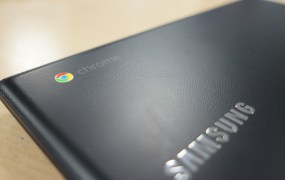Samsung is nothing if not opportunistic.
Just like with Android, the Korean electronics giant saw a huge opportunity in Google’s Chromebook platform, which turns the Chrome browser into a full-fledged operating system for cheap, low-powered computers.
[aditude-amp id="flyingcarpet" targeting='{"env":"staging","page_type":"article","post_id":1034514,"post_type":"story","post_chan":"none","tags":null,"ai":false,"category":"none","all_categories":"business,mobile,","session":"A"}']After launching the first Chromebook with Google in 2011, Samsung is doubling-down on its Chromebook commitment with two new models.
The Samsung Chromebook Series 2 comes in 11.6-inch and 13.3-inch variants, both of which sport Samsung’s octo-core Exynos 5 processor and 4 gigabytes of RAM. They’re also more like Ultrabooks now, with slimmer designs that measure under three-quarters of an inch thick. And, of course, the new Chromebooks feature the faux-leather backing that’s making an appearance across all of Samsung’s new products.
AI Weekly
The must-read newsletter for AI and Big Data industry written by Khari Johnson, Kyle Wiggers, and Seth Colaner.
Included with VentureBeat Insider and VentureBeat VIP memberships.
While the new Chromebooks are priced at $320 and $400, respectively, Samsung is still keeping its existing $250 Chromebook model around. With the improved hardware, Samsung reps tell me that it simply wants to introduce more choices for schools and businesses. The 13.3-inch model, for example, could serve as a powerful teacher’s computer, while the students make do with the cheaper models. Both new Chromebooks will be available in April.
By deploying Chromebooks in K-12 schools, Samsung tells me it jumped from minimal marketshare in the enterprise computing market to a 27 percent share last year. Indeed, the education space was huge for Chromebooks in general, which jumped from 0.5 percent of the computer market at the beginning of 2013 and ended the year with an 8 percent share.
Now with 60 percent of the Chromebook market, according to stats from NPD, Samsung clearly wants to hold on to its leadership role.
It’s easy to see why Chromebooks are becoming increasingly popular in schools: They’re cheaper than typical computers; they don’t require much IT maintenance, since they get updates from the cloud and are only focused on web-browsing; and they allow schools to bring technology into the classroom without getting locked down into an overly proprietary platform. (Yes, they’re meant to push students towards Google services, but you still have access to the open web. Chromebooks are certainly more open than bringing iPads into the classroom.)
Don’t hold your breath for ultra-cheap Samsung Chromebooks, though. Reps tell me that their customers are asking for more features, not fewer — and, of course, it’s far better for Samsung to sell expensive devices with higher profit-margins.
VentureBeat's mission is to be a digital town square for technical decision-makers to gain knowledge about transformative enterprise technology and transact. Learn More

